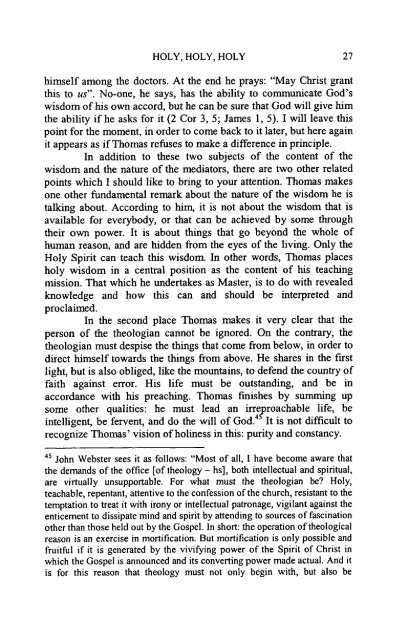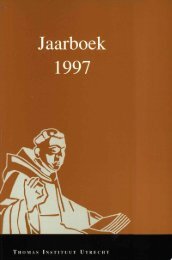Jaarboek Thomas Instituut 2006 - Thomas Instituut te Utrecht
Jaarboek Thomas Instituut 2006 - Thomas Instituut te Utrecht
Jaarboek Thomas Instituut 2006 - Thomas Instituut te Utrecht
You also want an ePaper? Increase the reach of your titles
YUMPU automatically turns print PDFs into web optimized ePapers that Google loves.
HOLY, HOLY, HOLY 27<br />
himself among the doctors. At the end he prays: "May Christ grant<br />
this to us". No-one, he says, has the ability to communica<strong>te</strong> God's<br />
wisdom of his own accord, but he can be sure that God will give him<br />
the ability if he asks for it (2 Cor 3, 5; James 1, 5). I will leave this<br />
point for the moment, in order to come back to it la<strong>te</strong>r, but here again<br />
it appears as if <strong>Thomas</strong> refuses to make a difference in principle.<br />
In addition to these two subjects of the con<strong>te</strong>nt of the<br />
wisdom and the nature of the mediators, there are two other rela<strong>te</strong>d<br />
points which I should like to bring to your at<strong>te</strong>ntion. <strong>Thomas</strong> makes<br />
one other fundamental remark about the nature of the wisdom he is<br />
talking about. According to him, it is not about the wisdom that is<br />
available for everybody, or that can be achieved by some through<br />
their own power. It is about things that go beyond the whole of<br />
human reason, and are hidden from the eyes of the living. Only the<br />
Holy Spirit can <strong>te</strong>ach this wisdom. In other words, <strong>Thomas</strong> places<br />
holy wisdom in a central position as the con<strong>te</strong>nt of his <strong>te</strong>aching<br />
mission. That which he undertakes as Mas<strong>te</strong>r, is to do with revealed<br />
knowledge and how this can and should be in<strong>te</strong>rpre<strong>te</strong>d and<br />
proclaimed.<br />
In the second place <strong>Thomas</strong> makes it very clear that the<br />
person of the theologian cannot be ignored. On the contrary, the<br />
theologian must despise the things that come from below, in order to<br />
direct himself towards the things from above. He shares in the first<br />
light, but is also obliged, like the mountains, to defend the country of<br />
faith against error. His life must be outstanding, and be in<br />
accordance with his preaching. <strong>Thomas</strong> fmishes by summing up<br />
some other qualities: he must lead an irrej'roachable life, be<br />
in<strong>te</strong>lligent, be fervent, and do the will of God.4 It is not difficult to<br />
recognize <strong>Thomas</strong>' vision of holiness in this: purity and constancy.<br />
4S John Webs<strong>te</strong>r sees it as follows: "Most of all, I have become aware that<br />
the demands of the office [of theology - hs], both in<strong>te</strong>llectual and spiritual,<br />
are virtually unsupportable. For what must the theologian be? Holy,<br />
<strong>te</strong>achable, repentant, at<strong>te</strong>ntive to the confession of the church, resistant to the<br />
<strong>te</strong>mptation to treat it with irony or in<strong>te</strong>llectual patronage, vigilant against the<br />
enticement to dissipa<strong>te</strong> mind and spirit by at<strong>te</strong>nding to sources of fascination<br />
other than those held out by the Gospel. In short: the operation of theological<br />
reason is an exercise in mortification. But mortification is only possible and<br />
fruitful if it is genera<strong>te</strong>d by the vivifying power of the Spirit of Christ in<br />
which the Gospel is announced and its converting power made actual. And it<br />
is for this reason that theology must not only begin with, but also be








